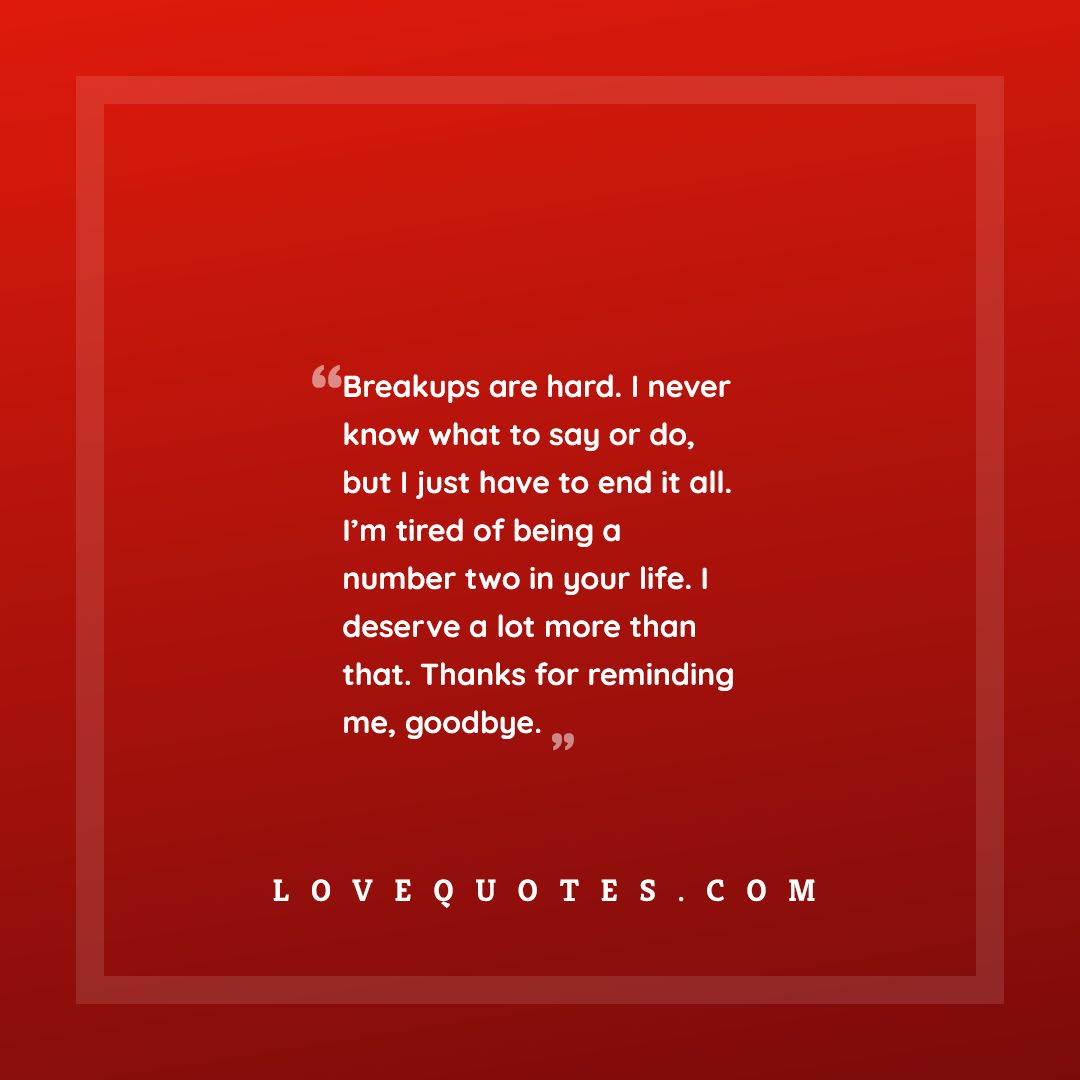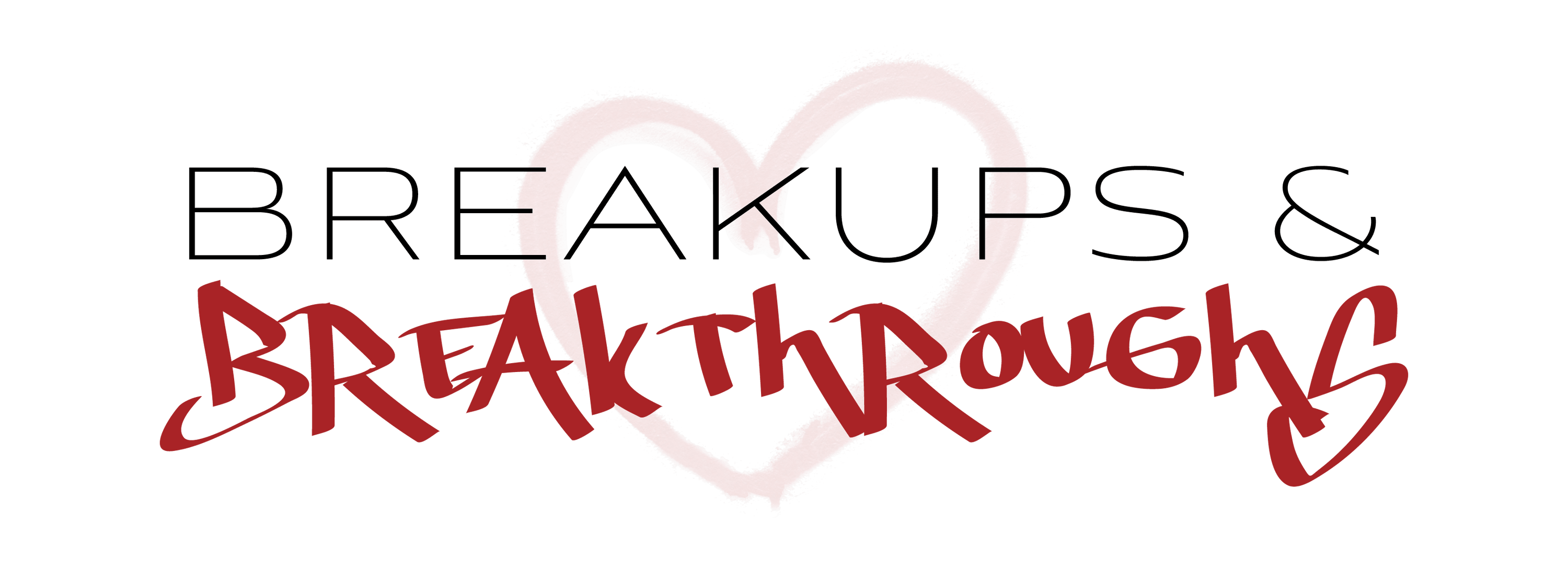Breaking Up: A Deep Dive Into The Emotional Rollercoaster Of Breakups
Ever wondered why breakups feel like a mix of heartbreak, liberation, and existential crisis all rolled into one? Well, you're not alone. Breakups are one of those life moments that hit hard, leaving you questioning everything from your self-worth to your favorite playlist choices. But hey, there’s more to it than just the pain. Let’s dive deep into the world of breakups and uncover what makes them such a universal yet deeply personal experience.
Now, let’s face it—breakups aren’t exactly something we plan for. They just kinda happen, often when you least expect it. And whether it’s mutual or not, the emotional toll can be overwhelming. But here’s the thing: understanding what happens during a breakup, why it hurts so much, and how to navigate through it can actually help you grow stronger. Think of it as a tough lesson in life that, while painful, teaches you a lot about yourself.
So, grab a cup of coffee (or wine, depending on your mood), and let’s unpack this whole breakup thing together. From the science behind heartbreak to practical tips for moving on, we’ve got you covered. Because at the end of the day, you deserve to feel empowered, not defeated, after a breakup.
Read also:Tea Leoni The Star Who Shines Beyond The Screen
Why Do Breakups Hurt So Much?
Alright, let’s get real for a sec. Breakups hurt. Like, a lot. But why? Turns out, there’s some serious science behind that emotional pain you’re feeling. When you’re in a relationship, your brain releases all sorts of feel-good chemicals like dopamine, oxytocin, and serotonin. These little guys create a sense of connection and attachment. So, when the relationship ends, your brain basically goes into withdrawal mode.
Studies have shown that the pain of a breakup can actually activate the same areas of the brain that respond to physical pain. Yeah, you read that right. Heartbreak isn’t just a metaphor—it’s a real, physical sensation. And if that’s not enough, the emotional attachment you built over time makes it even harder to let go. It’s like trying to untangle a knot that’s been tied for months or years.
The Emotional Rollercoaster of Breakups
Let’s break down the emotional stages most people go through after a breakup:
- Shock: At first, you might feel numb or disoriented. It’s like your brain is trying to process what just happened.
- Grief: This is where the tears and sadness kick in. You’re mourning the loss of the relationship and the future you imagined together.
- Anger: Yeah, this one’s pretty common. Whether it’s directed at your ex or yourself, anger is a natural response to feeling hurt.
- Acceptance: Eventually, you start to come to terms with the reality of the situation. This doesn’t mean you’re over it, but you’re ready to move forward.
And let’s not forget the infamous "what ifs" that creep into your mind. What if we tried harder? What if we stayed friends? These questions can keep you up at night, but they’re all part of the healing process.
Signs It’s Time for a Breakup
Not all breakups come out of the blue. Sometimes, the signs are there if you pay attention. Here are a few red flags that might indicate it’s time to call it quits:
- Constant Fighting: If every conversation turns into an argument, it might be time to reevaluate the relationship.
- Loss of Trust: Trust is the foundation of any healthy relationship. If it’s broken and can’t be repaired, it’s a big warning sign.
- Feeling Unhappy More Often Than Not: If you find yourself dreading time with your partner instead of looking forward to it, that’s a problem.
- Emotional Distance: When you no longer feel connected emotionally, it’s a sign that the relationship might be on its last legs.
Remember, staying in an unhealthy relationship just for the sake of avoiding a breakup isn’t a solution. Sometimes, letting go is the best thing you can do for yourself.
Read also:Mase 49 The Ultimate Guide To Understanding And Exploring His Remarkable Journey
When to Seek Professional Help
Breakups can be incredibly difficult, and sometimes the emotional toll is too much to handle alone. If you’re struggling to cope, don’t hesitate to reach out to a therapist or counselor. They can provide you with tools and strategies to help you process your emotions and move forward.
According to the American Psychological Association, therapy can be incredibly beneficial during times of emotional distress. It’s like having a professional guide to help you navigate the stormy seas of heartbreak.
How to Survive the First Few Weeks After a Breakup
The first few weeks after a breakup are usually the hardest. Here’s how you can survive them:
Tips for Coping with the Initial Pain
- Lean on Friends and Family: Surround yourself with people who care about you and can offer support.
- Stay Busy: Distract yourself with hobbies, work, or anything that keeps your mind off the breakup.
- Limit Contact with Your Ex: It’s tempting to text or call, but giving yourself space is crucial for healing.
- Practice Self-Care: Treat yourself kindly during this time. Eat well, exercise, and get plenty of rest.
It’s okay to feel overwhelmed during this period. Just remember, it’s temporary. The pain will lessen over time, and you’ll start to feel like yourself again.
Understanding the Science of Heartbreak
Heartbreak isn’t just a poetic term—it’s a real, scientifically-backed phenomenon. Research has shown that the brain processes emotional pain in much the same way as physical pain. In fact, studies using MRI scans have revealed that the same regions of the brain light up when someone experiences heartbreak as when they experience physical injury.
Additionally, the attachment chemicals we mentioned earlier—like oxytocin and dopamine—play a big role in why breakups hurt so much. When these chemicals are suddenly absent, it can lead to feelings of withdrawal and cravings, much like an addiction.
Can You Really ‘Get Over’ Someone?
While the idea of “getting over” someone might seem like a tall order, it’s definitely possible. Healing from a breakup takes time, effort, and patience. Some people might bounce back quickly, while others need more time to process their emotions. And that’s okay. Everyone heals at their own pace.
What’s important is that you give yourself permission to grieve and move forward at your own speed. There’s no timeline for healing, and comparing yourself to others won’t help. Focus on what you need to do to feel better, whether that’s journaling, talking to a therapist, or simply taking a break from dating for a while.
Long-Term Effects of Breakups
While the immediate aftermath of a breakup can be brutal, the long-term effects can vary depending on how you handle the situation. Some people emerge stronger and more self-aware after a breakup, while others might struggle with trust issues or fear of commitment in future relationships.
Building Resilience After a Breakup
Here are a few ways to build resilience and come out stronger after a breakup:
- Reflect on the Relationship: Take some time to think about what went wrong and what you learned from the experience.
- Set New Goals: Focus on personal growth and set new goals for yourself, whether they’re career-related or personal.
- Practice Gratitude: Shift your focus to the positive aspects of your life. Gratitude can help rewire your brain to focus on the good things.
- Stay Open to New Relationships: When you’re ready, don’t be afraid to put yourself out there again. You never know what the universe has in store for you.
Remember, every breakup is an opportunity for growth. It might not feel like it at the time, but looking back, you’ll see how much you’ve learned and grown from the experience.
When Love Goes Wrong: Lessons from Breakups
Breakups can teach us some valuable lessons about love, relationships, and ourselves. Here are a few takeaways:
- Communication is Key: Miscommunication is often at the root of many relationship problems. Learning to communicate effectively can prevent future heartache.
- Self-Worth Comes First: Never let anyone make you feel unworthy of love and respect. Your self-worth isn’t tied to someone else’s opinion of you.
- Not Every Relationship is Meant to Last: Some relationships are meant to teach us something, even if they don’t last forever.
These lessons might not make the pain of a breakup go away, but they can help you approach future relationships with a more open and informed mindset.
Breaking the Cycle: How to Avoid Repeating Past Mistakes
One of the biggest challenges after a breakup is avoiding the same mistakes in future relationships. Here’s how you can break the cycle:
- Identify Patterns: Take a look at your past relationships and identify any recurring patterns or behaviors that might have contributed to the breakup.
- Work on Yourself: Focus on personal growth and self-improvement. The better you know yourself, the better equipped you’ll be to handle future relationships.
- Set Boundaries: Learn to set healthy boundaries in your relationships. This will help prevent future conflicts and misunderstandings.
Remember, relationships are a two-way street. Both partners need to be willing to put in the effort to make things work. If you’re not getting what you need from a relationship, it’s okay to walk away.
Conclusion: Embracing the Journey After a Breakup
So, there you have it—a deep dive into the world of breakups. While they’re undoubtedly painful, they’re also an opportunity for growth and self-discovery. By understanding the science behind heartbreak, recognizing the signs of a toxic relationship, and learning from past mistakes, you can emerge stronger and wiser after a breakup.
Don’t forget to take care of yourself during this time. Lean on your support system, practice self-care, and give yourself permission to grieve. And when you’re ready, don’t be afraid to put yourself back out there. Love is worth the risk, and every breakup brings you one step closer to finding the right person.
So, what are you waiting for? Share your thoughts in the comments below, or check out some of our other articles on relationships and personal growth. You’ve got this!
Table of Contents
- Why Do Breakups Hurt So Much?
- The Emotional Rollercoaster of Breakups
- Signs It’s Time for a Breakup
- When to Seek Professional Help
- How to Survive the First Few Weeks After a Breakup
- Tips for Coping with the Initial Pain
- Understanding the Science of Heartbreak
- Can You Really ‘Get Over’ Someone?
- Long-Term Effects of Breakups
- Building Resilience After a Breakup
- When Love Goes Wrong: Lessons from Breakups
- Breaking the Cycle: How to Avoid Repeating Past Mistakes
Article Recommendations


